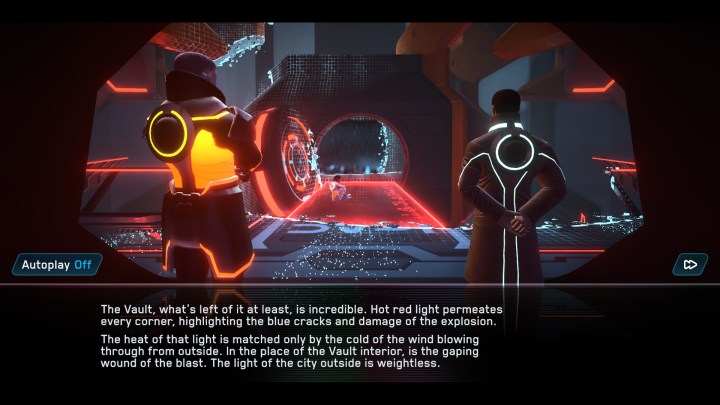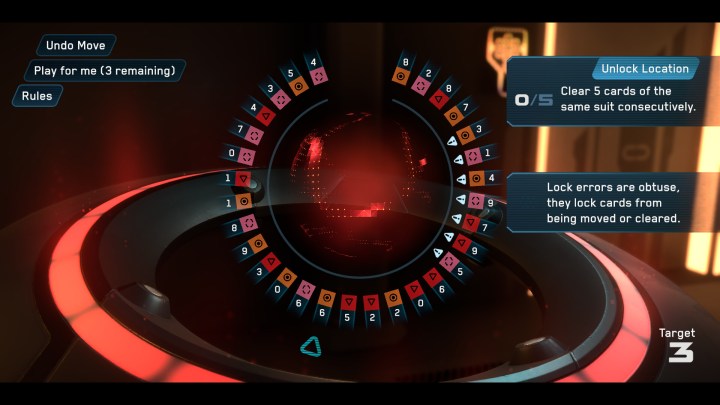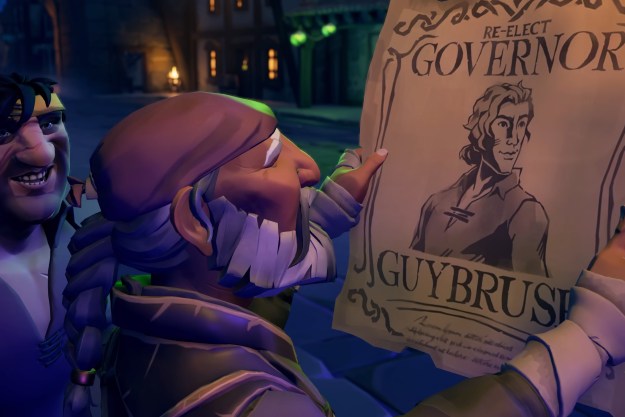
“Tron: Identity is a smart and respectful use of the classic series, turning it into a gripping sci-fi detective story.”
- Respectful use of IP
- Gripping mystery
- Impactful choices
- Fun defragging puzzles
- No voice acting
- Miniscule UI
When you picture a Tron video game, what comes to mind? Perhaps you’re imagining a light cycle game that has you racing to the death. Maybe you’re seeing a third-person action game where you toss discs and derez rogue programs. Whatever you’re currently dreaming up, it’s likely not a two-hour visual novel that uses the digital world to wax philosophical about how little control we have over the world around us. That’s exactly what Tron: Identity is — and it turns out that’s the best use of the Disney IP since its arcade days.
Out now on Nintendo Switch and PC, Tron: Identity is a logical project for Bithell Games and Mike Bithell. The director previously experimented with short-form, sci-fi visual novels in the late 2010s with Subsurface Circular and Quarantine Circular, two futuristic titles about learning to communicate with robots and alien lifeforms. In context, those games now feel like a rehearsal for his latest title as the world of Tron is a natural fit for that premise. Bithell weaves an engrossing digital mystery here that gives players the chance to better understand the ins and outs of the Grid.
Tron: Identity is the most thoughtful, and perhaps respectful, use of the Tron franchise we’ve ever gotten from a video game. It’s a short, cerebral detective story that’s genuinely curious about how the digital inhabitants of the series’ world perceive the Grid. It’s a successful experiment in restraint, resisting the urge to reduce Tron to another hollow video game playground in order to unearth the humanity hidden under layers of neon.
Disc runner
Tron: Identity is a classic sci-fi detective story, almost feeling more like a Blade Runner game (a project Bithell and company could likely knock out of the park given the chance). The story begins after a burglary at the Grid’s central structure, The Repository. A program named Query is brought in to solve the case, questioning a select few characters in the building who’ve had their memories scrambled in an explosion. The story mostly plays out in a motion comic format, with static images, text, and dialogue choices.

While a lack of voice acting and tiny UI make for a frustrating mix, Tron: Identity shines as a visual novel thanks to sharp writing. The central mystery makes for a gripping neo-noir that’s made all the more impactful thanks to meaningful decisions. Dialogue choices truly matter here (something Pentiment recently pulled off expertly), as each character has a small relationship tree that significantly impacts the story. Without giving away too much, I squandered a critical lead in my story thanks to an itchy trigger finger.
There isn’t a glut of choices here, and most characters only have around three potential conclusions to their arcs, but that was enough to make me want to start a new file the second it ended. There were still threads to unravel after the credits rolled.
What’s most compelling here, though, is when Bithell uses the world of Tron as a platform for philosophical pondering. The story takes place in a Grid that’s been abandoned by its creator, with programs acting without user input. I found myself eager to find out how every character was coping with that fact, going through a very familiar crisis of faith reflective of real-world religious debates. Some programs patiently wait for their creator to return, while others want to claim the Grid as their own. There’s an undercurrent of anxiety throughout The Repository, as I can feel every program grappling with the fear that they have no control over their situation. There’s an inevitability to their existence that everyone is battling. That makes the impactful choice system all the more meaningful, as it lets Query find some semblance of control amidst crisis.
Defrag an IP
Outside of the story, the world of Tron remains an obvious fit for a video game on an aesthetic level. We get a solid soundtrack of ominous electronic tracks here and the visuals are familiar, dealing out the film’s cool neon tones. Tron: Identity certainly isn’t flashy with its static images, which may disappoint those who love the series for its look, but the restrained look keeps the emphasis on the narrative and characters.
The other IP twist comes in the form of a simple minigame that calls back to Bithell’s The Solitaire Conspiracy. To reconstruct a character’s memory, players have to defrag their energy disc. That plays out in a simple, but enjoyable puzzle game where players have to clear a semicircle of cards by pairing matching suits or numbers to delete a card. Cards can only be matched to the ones they’re adjacent to or to one three spots away. Other little rule complications pop up the deeper the story goes, as late puzzles introduce cards that jump positions or spawn new cards if not cleared.

It might feel like a random bit of gamification to break up a text-heavy story, but it’s an addictive little minigame that’s careful not to overstay its welcome. The rules are easy to understand and I never found myself backed into a corner I couldn’t get out of (an undo button helps ease that, as does the ability to let AI make a few moves for you). It’s only hurt by the tiny UI, which makes it a little difficult to select individual cards when using a joystick. For those who really dig it, there’s a dedicated endless mode included here that makes for a fun time-killer.
I’ve always appreciated Tron for its stylish visuals, but I walked away from Tron: Identity with a much better grip on its world. Especially in an age where artificial intelligence is a hot topic, it’s a perfect time to dig into the programs and raise questions about digital sentience. It might be a bit heady for some, and it certainly asks more questions than it can answer, but it all makes for a gripping story that requires no prior knowledge of Tron to appreciate.
Tron: Identity was reviewed on Nintendo Switch.
Editors' Recommendations
- Fortnite is coming back to iOS, but Epic Games still isn’t happy about it
- Warner Bros Games chief isn’t worried about the Discovery merger
- A new Half-Life game is official, and it isn’t what you’d expect




